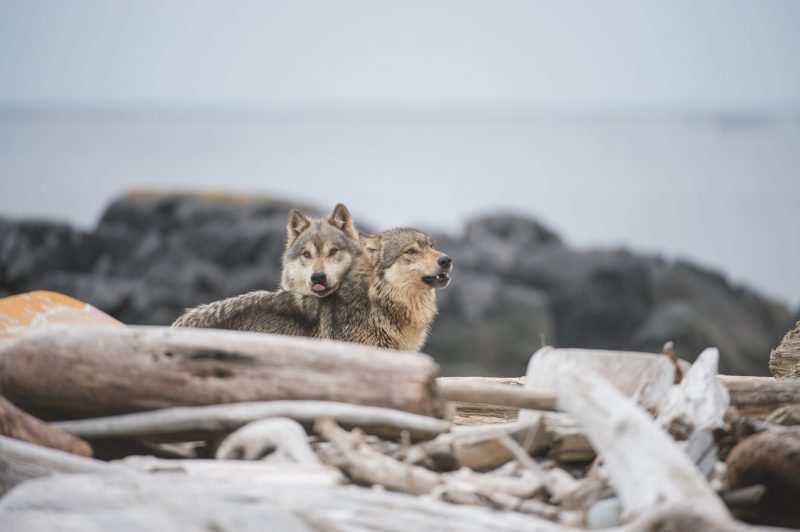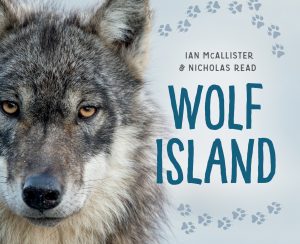#173 Always cry wolf
September 29th, 2017
Wolf Island
by Ian McAllister (photographs) and Nicholas Read (text)
Victoria: Orca Book Publishers, 2017.
$19.95 / 9781459812642
Reviewed by Carol Anne Shaw
*
Wolf Island is a picture book co-created by photographer, author, and Pacific Wild founder Ian McAllister and author and former journalist Nicholas Read.
It is one of four non-fiction books in Orca Books’ Great Bear Rainforest series — books for children focusing on the natural world of B.C.’s 21-million acre coastal temperate rainforest that stretches from Discovery Passage in the south to the border with Alaska in the north.
Previous volumes in the acclaimed series are The Salmon Bears (2010), The Sea Wolves (2010), and The Great Bear Sea (2013), all aimed at readers aged 8-14.
Wolf Island is the story of a young wolf’s departure from his pack and his search for a new life of his own. In simple yet compelling language we follow his journey as he learns to survive, and eventually thrive, on one of the many islands that make up the vast and diverse coastline of the Great Bear Rainforest.
This book is a treasure. From rain to ravens, from sea to salmon, it’s a quintessential West Coast delight. You can smell the salt and cedar, you can hear the waves as they pummel the shoreline, and you can almost feel the chilly morning mist upon your face.
McAllister’s photographs are stunning. Each one captures the mysterious and elusive nature of this unique subspecies of sea wolves, as well as the rugged and unspoiled beauty of this special part of the central coast of British Columbia.
 The book’s photographic palette is easy on the eyes. Each page is a celebration of blues and greens and greys, and every image feels as though it is telling a story all its own.
The book’s photographic palette is easy on the eyes. Each page is a celebration of blues and greens and greys, and every image feels as though it is telling a story all its own.
Readers, young and old, will be rooting for our lone coastal wolf. They will cheer him on as he overcomes both physical and mental challenges to establish himself on his new and unfamiliar island.
Not only will younger readers find themselves invested in his journey and his quest to find a mate, they will learn some interesting facts about coastal wolves in general. They will learn about pack structure, hunting habits, and perhaps most fascinating of all, the finely tuned social instincts that ensure the survival of their species.
The coastal wolf is a smart canine and, over the years, has adapted well to the wild coastline he calls his home.
Ultimately, young readers will finish this down-to-earth story with a greater understanding and appreciation of the Great Bear Rainforest as well as the important role played by forest, ocean, and wildlife in this beautiful and ecologically sensitive part of our world.
Wolf Island is also educational and up-to-date. Readers will learn that the coastal rainforest could just as easily be called the Great Salmon Forest.
Tom Reimchen of the University of Victoria discovered a salmon nitrogen “signature” in the trees surrounding salmon rivers caused by bears, wolves, and other scavengers that carry salmon carcasses into the adjacent forest where their nutrients are absorbed into a diversity of plant and animal life.
This discovery is reflected in the following passage:
The island wolf was thrilled to see the salmon. He knew they would keep coming for months, and he would keep eating them. What he didn’t realize was that when he ate the salmon, he fed the rainforest too. What he didn’t eat, the birds ate. And what the birds didn’t eat, insects and worms ate. They, in turn, enriched the rainforest soil by breaking down what was left of the fish into fertilizer, which then nourished the tall trees growing out of the soil. Every bit of the salmon was used by someone or something. Nothing was wasted. In nature, nothing ever is.
A treat for the senses, the eyes, and the young intellect, Wolf Island will be enjoyed by avid readers, artists, nature lovers, and photographers of all ages for years to come.
*
Carol Anne Shaw is the author of the “Hannah” books, all from Ronsdale Press: Hannah & the Spindle Whorl (2010), Hannah & the Salish Sea (2013), and Hannah & the Wild Woods (2015). When not writing, Carol Anne can often be found painting at her easel or hiking the local trails that surround her home in the Cowichan Valley on Vancouver Island.
*
The Ormsby Review. More Readers. More Reviews. More Often.
Reviews Editor: Richard Mackie
Reviews Publisher: Alan Twigg — BC BookWorld / ABCBookWorld / BCBookLook / BC BookAwards / The Literary Map of B.C. / The Ormsby Review
The Ormsby Review is a new journal for serious coverage of B.C. literature and other arts. It is hosted by Simon Fraser University. The Advisory Board consists of Jean Barman, Robin Fisher, Cole Harris, Wade Davis, Hugh Johnston, Patricia Roy, David Stouck, and Graeme Wynn.
“Only connect.” – E.M. Forster






Leave a Reply